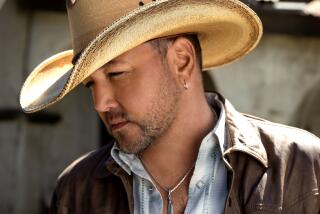Why the ‘Take Down Your Flag’ songwriter was willing to be rude after Charleston shooting
After the killings of nine black church members by a white gunman in Charleston, S.C., folk singer-songwriter Peter Mulvey tried to make sense of the massacre by talking about the event with other musicians.
Two days after the shooting at Emanuel African Methodist Episcopal Church, Mulvey penned a simple, three-chord tribute, “Take Down Your Flag,” and performed it that night, opening for folk rocker Ani DiFranco in Northampton, Mass. The song’s second verse focused on Susie Jackson, the eldest of the victims.
“I wasn’t trying to do anything different with this song than I do with any song,” Mulvey said, speaking by phone from his home in Milwaukee. “I was just trying to figure something out and write a song, but this one got away from me real quick.”
When Mulvey posted the video to YouTube and received a comment asking about the song’s eight missing verses (one for each life that was lost), he began requesting other folk artists – some of whom had already expressed interest in recording covers – to write their own versions.
“My phone rang and my pal Ralston [Bowles] asked if he could cover the tune and I just said, ‘Only if you please write a verse for someone else,’” Mulvey said.
Ten days after the song was written, “Take Down Your Flag” has inspired more than 100 versions uploaded to YouTube, including those by Bowles, DiFranco, Anais Mitchell and dozens of amateur artists. Each recording features a newly written verse, highlighting one of the nine victims, the AME Church or whatever that singer chooses. A video posted last week by Mulvey gives a workshop on how musicians can learn the song and add their own second verse.
As more than a dozen of Mulvey’s friends published their versions, including Pamela Means’ tribute to South Carolina state Sen. Clementa Pinckney, folk singer Vance Gilbert chose to write his second verse about the shooter, Dylan Roof.
“Dylan, his guns and his sad, sick disposition all given permission to shoot everyone dead, by some stars and some bars that are all wrong and dated,” Gilbert sings in his video.
Gilbert said he was home at 1 a.m. when Mulvey reached out to him about contributing to the song. Gilbert stayed up thinking about what could have led Roof to commit the massacre.
“I was in bed and I just couldn’t have slept,” he told the Times. “I needed to get it done. ... If you’re moved by something, you have to listen. You have to heed that call.”
When Mulvey told Gilbert that he felt his verse had expressed forgiveness, Gilbert corrected him.
“No, this is a verse for a song,” he said. “Forgiveness is a process, and I’m working on it.”
As the song gathers more grass-roots support in the folk community, Mulvey said his hope is for it to be picked up by a commercial country singer because of the genre’s historic roots in Southern states.
“I didn’t call this song, ‘Take Down the Flag,’” Mulvey said. “I said, ‘Take Down Your Flag,’ because it’s a very impolite suggestion. I’m talking directly to the people who view that as a symbol of their heritage. . . I’m willing to be rude because right now, human beings are burying their families and that flag is flying over it.”
On Saturday, when activist Bree Newsome climbed the flagpole in front of the South Carolina Statehouse and temporarily removed the Confederate flag, Mulvey took to the song again, this time dedicating the second verse to Newsome for her actions.
“All of this is just a song,” Mulvey said. “The main thing is action.”
Mulvey is also organizing a benefit concert on July 12 using Concert Window, a service that streams musicians live to connect with their fans. Mulvey said he wants to give any musician the opportunity to join their concurrent streaming concerts by performing their versions of “Take Down Your Flag.” All the donations received from this online music festival will go to the AME Church and the Mother Emanuel Hope Fund to assist relatives of the victims.
Gilbert, who said he will be performing during the benefit, said the most important effect the song can have is to inspire conversation.
“At some point you have to start asking the questions to why something like this would happen,” Gilbert said. “I hope people both heal and then start asking questions.”
More to Read
The biggest entertainment stories
Get our big stories about Hollywood, film, television, music, arts, culture and more right in your inbox as soon as they publish.
You may occasionally receive promotional content from the Los Angeles Times.










